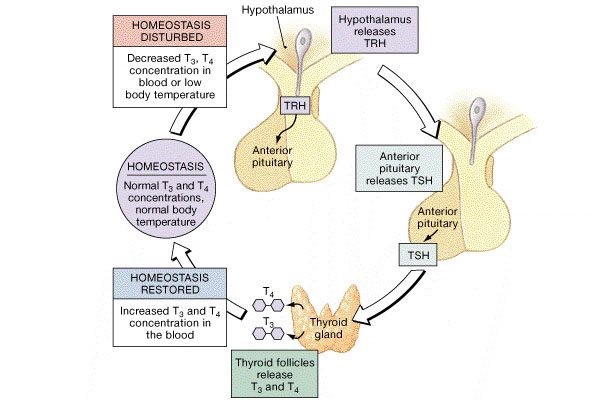What you should know about Thyroid-Stimulating Hormones (TSH)
- 28 Aug, 2017
- Written by Team Dr Lal PathLabs
Medically Approved by Dr. Seema
Table of Contents

Thyroid-stimulating hormone or TSH is a hormone produced by the pituitary gland. It is one of the primary hormones of the body that aids in the conduction of a plethora of vital bodily activities including regulation of metabolism, release of hormones by the thyroid gland and much more. A TSH test aids in the measurement of the amount of TSH present in the bloodstream. For an excessively low or high quantity of this element is known to cause the onset of a number of chronic diseases and conditions in the body.
Thyroid is a small butterfly shaped gland that sits atop the neck. It’s one of the main glands of the body that typically produces three hormones – triiodothyronine (T3), thyroxine (T4), and calcitonin. Each of these hormones is linked with the production of TSH. To clear the air, the thyroid produces hormones when the pituitary gland releases TSH in the blood. This means that, two glands work together and ensure the right amount of hormones are made. However, in the event one of these glands dysfunctions, the working of the other one is affected too.
Physicians usually recommend a TSH blood test to check for the existence of any underlying causes of atypical production of hormones in these two glands. In addition to this, it’s also suggested for screening an overactive or underactive thyroid gland.
Why It Is Done
There are a number of reasons why a physician will recommend a TSH test to a person. A few were listed above, and a few more are as follows:-
1) To determine whether or not the thyroid gland is working properly.
a. Tiredness, dry skin, weight gain, constipation, a feeling of being too cold, or frequent menstrual periods are some of the top symptoms of an underactive thyroid gland (hypothyroidism).
b. Nervousness, diarrhea, weight loss, rapid heart rate, feeling too hot, or experiencing irregular menstrual periods, are some top signs of an overactive thyroid (hyperthyroidism).
2) To see whether the thyroid medications for hypothyroidism are working as expected, or if there’s a need to increase/decrease dosage or change medicines altogether.
3) Look into the cause of an underactive thyroid gland (hypothyroidism). TSH quantities in the bloodstream can help in knowing if a patient has hypothyroidism because of a damaged thyroid gland or some other causes persist therein, such hypothalamus, etc.
4) Tracking the functionality of the thyroid gland in patients with hyperthyroidism. This may include surgery, antithyroid medicine prescription, or radiation therapy.
5) Diagnosing an underactive thyroid gland in a newborn baby (congenital hypothyroidism).
What Makes TSH Fluctuate?
TSH fluctuates due to the change in the TRH. Once TSH makes its way to the thyroid gland, the levels are largely dictated by the amount of T3 & T4 in your blood. The body produces more TSH to stimulate the thyroid when T3 and T4 levels are low. But when T3 & T4 levels are high, the body produces less quantities of these two hormones.

Image Courtesy: Precision Nutrition
There are several other factors too, that can influence TSH levels: [show_more more=”Continue Reading ▼” less=”Show Less ▲”]
- Genetics
- Poisonous substances and radiation exposure
- Inflammation of the thyroid gland
- Deficiency or excess of iodine in the diet
- Pregnancy
- Certain medications – antidepressants, cholesterol lowering drugs, chemotherapy drugs, steroids
- Thyroid cancer
How to Prepare for a TSH Test?
Before a TSH test, it is highly advised that a patient must inform his/her physician if he/she has had tests that involved the use of radioactive materials or an X-Ray that used iodine dye, within the last 4 to 6 weeks. These contents are known to hinder with the test results and obtaining precise and accurate result may be difficult.
How is the Test Performed?
The following steps are undertaken for performing a TSH blood test:-
- A lab nurse or technician will first look for a healthy vein around your arm. He/she will then wrap an elastic band around the upper arm to stop the flow of blood. Basically, this makes the vein to swell up and allow easy access.
- The vein puncture point is then cleaned using an alcohol swab.
- A fresh, sterilized needle is then inserted into the vein. (In some rare cases, more than one vein puncture may be needed for easy extraction of the blood)
- The needle is either attached to a syringe or directly to a tube for the collection of blood.
- Post extraction of blood, the point of puncture is tactically closed using another alcohol swab. The band is removed too.
- The application of alcohol swab restricts the outflow of blood and allows the platelets to block the point of puncture.
Additional Tests for Thyroid Health
Given the potential inaccuracies with TSH on its own, comprehensive screening of thyroid health should ideally include these 6 tests:
- TSH
- Free T3
- Free T4
- Reverse T3
- Thyroid Peroxidase Antibodies
- Thyroglobulin Antibodies
- Your doctor should be aware of these tests.
Hypothyroidism TSH Levels
The TSH levels in the blood can theoretically be a good marker of thyroid health. Here’s the chart which shows a simplified version of what different readings can indicate.
|
TSH Levels |
T3 and T4 Levels |
Disease Condition |
|
High |
High |
Tumor of pituitary gland |
| Low | Low |
Secondary hypothyroidism |
|
Low |
High |
Grave’s disease |
|
High |
Low |
Hashimoto’s disease |
Normal TSH levels
The normal TSH levels in an average adult range between 0.4 and 4.0 mIU/L (milli-international units per liter). For those on thyroxine, the goal TSH level is between 0.5 and 2.5 mU/L.
The reference ranges alter slightly as we grow older and in the case of a pregnancy:
- TSH levels in premature babies (28‑36 weeks)
- 7‑27 mIU/L
- TSH level in children
- Birth to 4 days: 1‑39 mIU/L
- 2‑20 weeks: 1.7‑1 mIU/L
- 21 weeks to 20 years: 0.7‑64 mIU/L
- TSH level in adults
- 21‑54 years: 0.4‑2 mIU/L
- 55‑87 years: 0.5‑9 mIU/L
- TSH level during pregnancy
- First trimester: 0.3‑5 mIU/L
- Second trimester: 0.3‑6 mIU/L
- Third trimester: 0.8‑2 mIU/L
It is vital to note that these above mentioned ranges can and/or may vary from one laboratory to another due to the use of different measurement techniques. The best way to check whether or not the levels are normal is by consulting a physician. He/she will give you a precise view of the working of your thyroid as well as the pituitary gland.
High TSH Levels
A high TSH level means the test value falls beyond 4.0 mIU/L. It typically indicates an underactive thyroid gland or the condition of hypothyroidism – producing too little thyroid hormone. Some of the common causes of hypothyroidism include radiation treatment, an autoimmune disease (known as Hashimoto’s disease), or surgical removal of the thyroid gland.
Low TSH levels
A TSH reading below 0.4 mIU/L indicates low TSH levels in the bloodstream. The low amounts typically persist in the case of an overactive thyroid gland, otherwise known as a condition of hyperthyroidism. It means that the thyroid gland produces more than required quantities of T3 and T4 hormones.
Hyperthyroidism is also closely associated with goiter, Graves’ disease, excessive content of iodine in the body, or an overdose of synthetic thyroid hormone. [/show_more]













